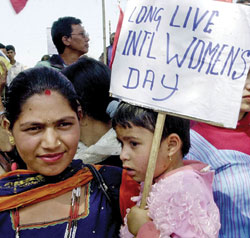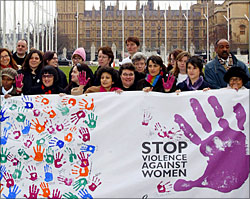The Convention on the Elimination of all forms of Discrimination Against Women (CEDAW) was adopted in 1979 by the United Nations General Assembly. One hundred thirty one states voted affirmatively to adopt the Convention and ten states abstained from voting, but there were no dissenting votes. In July of 1980, sixty-four states signed the Convention and two states submitted their ratifications. The Convention entered into force in September of 1981 – faster than any previous convention on human rights.
This “international bill of rights for women” defines discrimination against women and outlines the steps required to end such discrimination on a national level. The Convention on the Elimination of all forms of Discrimination Against Women helps to ensure women’s equal access to all aspects of their countries society – including political and public life. In States that have signed the Convention, women must be allowed to vote and stand for election. The Convention also focuses on women’s equal access to education, healthcare, and employment. CEDAW is the only human rights treaty which incorporates the reproductive rights of women.
By signing the Convention, member States of the United Nations agree to undertake several measures to end all forms of discrimination against women. This includes incorporating gender equality into their legal systems and abolishing laws which discriminate against women. Furthermore, these laws must be replaced with laws the prohibit discrimination against women. States also agree to establish institutions to ensure that women are protected from all forms of discrimination, including discrimination practiced by individuals, organizations, and businesses.
Currently, one hundred and eighty five states have signed CEDAW. However, only one hundred and eighty four have ratified it. The United States is the only signatory country who has not ratified the Convention, and therefore is not required to enact its provisions. United Nations member states that have ratified the Convention include many states which American culture commonly portrays as lacking in women’s rights: Afghanistan, the People’s Republic of China, the Democratic People’s Republic of Korea (North Korea), the Democratic Republic of the Congo, Iraq, Burma (Myanmar), the Republic of Korea (South Korea), and Thailand.




